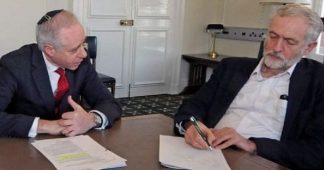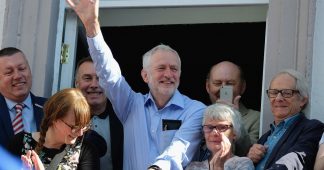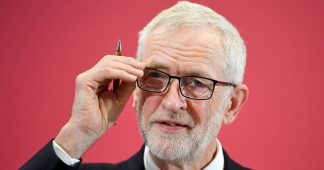The British Labour Party botched its response to false allegations of rampant antisemitism among the party membership. Left-wing movements in other countries can’t make the same mistake.
By Jamie Stern-Weiner
Feb. 21, 2020
The story of that campaign, its role in Labour’s 2019 election defeat, and the party’s failure to respond effectively to a torrent of disinformation is an important case study for left-wing movements in other countries — not least the United States, where a similar campaign may well be in the offing.
Framing Corbyn
The central allegations against Labour were that antisemitism became widespread in the party as its membership more than doubled in support of Jeremy Corbyn’s leadership, and that Corbyn was himself an antisemite. These claims were advanced in a register that can only be described as unhinged.
Labour was stigmatized as “the party of bigots and thugs, where Jew haters are cheered,” a “racist party,” “the most antisemitic party . . . in generations” which posed “an existential threat to British Jews.” Corbyn himself was said to be “a fucking antisemite and a racist,” the “most dangerous man in Britain,” “Britain’s most prominent antisemite,” “the most dangerous racist in British politics . . . whose toxic views and behaviour pose a far greater threat to ethnic minorities than the [neofascist] National Front or [British National Party] BNP ever managed.”
Such claims were not marginal excesses on the fringe of an otherwise sober narrative: they were the narrative.
Yet no persuasive evidence was ever presented in support of either allegation. Corbyn was not an antisemite but, on the contrary, a veteran anti-racist and anti-fascist campaigner, for whom the 1936 “Battle of Cable Street” was a formative influence, and who has long counted Jewish socialists among his closest collaborators. Far from being in imminent peril, British Jewry actually constituted the most prosperous and well-integrated minority community in a country where, according to the Institute for Jewish Policy Research (JPR), levels of antisemitism were “among the lowest in the world,” and Jews were “seen overwhelmingly positively by an absolute majority” of the general population.
The prevalence of anti-Jewish stereotypes among Labour supporters did not soar under Corbyn but, on the contrary, “remained fairly consistent” throughout his time as leader, according to the Campaign Against Antisemitism (CAA). Levels of antisemitism were not unusually high among left-wingers and Labour supporters; in fact, the JPR found, Britain’s “political left” was on average “a more Jewish-friendly, or neutral, segment of the population.” The CAA’s research showed that Labour Party supporters were “less likely to be antisemitic than other voters.”
Even as “Labour antisemitism” hunters spent years feverishly trawling through the social-media histories of party members for incriminating material, the proportion of members subjected to disciplinary action in relation to anti-Jewish comments rounded to literally zero. When the anti-Corbyn Labour MP Margaret Hodge submitted 200 complaints about 111 people, Labour’s general secretary Jennie Formby had to inform her that just twenty of those people were Labour members — which did not stop Hodge from trumpeting her complaints in the national media as evidence of an “antisemitism crisis.”
Comment Is Free
If many came to believe the claims about pervasive, endemic antisemitism in the Labour Party, this was primarily because, as the Media Reform Coalition put it, the British press set out to undermine Corbyn “with a barrage of overwhelmingly negative coverage.” The “Labour antisemitism” campaign was the most extreme manifestation of this hostility.
Press coverage was replete with factual errors. It was widely reported, for example, that the 2017 Labour Party conference played host to numerous instances of antisemitism — in the British tabloid idiom, “an abundance of wild-eyed, mouth-foaming hatreds” as “the tumour of anti-Semitism that grows in the rancid guts of Labour moved centre stage” — yet none of the concrete allegations withstood proper scrutiny, and nearly all turned out to implicate people who were themselves Jewish. (As the old cliché goes: two Jews, three antisemites.)
The British media abandoned any semblance of rational criteria for assessing news value, to the extent that random Facebook posts by ordinary Labour members and factional wranglings over internal party complaints procedures became the stuff of national headlines. And no effort was made to set the allegations against Labour within a wider social or statistical context, with the result that coverage wildly inflated the perceived scale of the problem and inverted the real political distribution of racism in contemporary Britain.
The 2019 election campaign brought these shoddy journalistic practices to a crescendo. The Evening Standard, London’s daily newspaper, fabricated a quote from an interview with Jeremy Corbyn, then corrected the online edition, without, however, providing any explanation of how the “error” had come about. The Guardian’s Jonathan Freedland defamed a Labour election candidate, Majid Mahmood, as an antisemite, because he had the same name as another man — a typical example of the fact-checking standards applied to claims about “Labour antisemitism” by Britain’s most prestigious liberal newspaper, and by Freedland in particular. And in a bizarre conclusion to this protracted affair, Corbyn’s pronunciation of the name “Jeffrey Epstein” became further “proof” of his antisemitism.
Fears and Dismay
In the wake of Labour’s election disaster, a number of political and media figures faced condemnation for blaming the result on Israel and/or British Jewish organizations. This was a flawed explanation for the result, as we shall see. However, these figures were simply taking Corbyn’s opponents at their word.
Already in 2018, Marie van der Zyl, the president of the Board of Deputies of British Jews (BOD), had boasted that “we showed how we could keep this issue of antisemitism on the front pages day after day, week after week, exacting a severe political and reputational cost.” After Labour’s defeat, Joe Glasman of the CAA recorded a triumphant message: “We did it!” Marie van der Zyl rejoiced over the “unprecedented levels of unity” shown in the battle against Labour.
In the weeks leading up to the vote, the Jewish Labour Movement, which is affiliated to the Labour Party, announced its refusal to campaign for Labour, and publicized its leaked submission to an Equality and Human Rights Commission investigation of Labour’s handling of antisemitism-related complaints. The CAA released a report claiming that antisemitic views were most widespread on the Left and among supporters of Corbyn — even though its actual figures, in line with previous studies, showed the opposite — and convened a public “rally against antisemitism” implicitly targeting Labour.
The former chair of the Reform Movement broke a taboo to advise that congregants “vote for whichever party is most likely to defeat Labour” since “a Corbyn-led government would pose a danger to Jewish life as we know it.” Chief Rabbi Ephraim Mirvis all but urged a vote against Labour, in a statement timed to derail the party’s “Race and Faith” manifesto launch. The Jewish Chronicle implored its non-Jewish readers to take a stand: if Corbyn was chosen as Britain’s prime minister, the message would be sent that our “fears and dismay count for nothing.”
These heartfelt appeals from representatives of Britain’s most prosperous and well-integrated minority group ignored the fact that Jeremy Corbyn was running against the party that implemented a “hostile environment” for immigrants and oversaw the Windrush scandal, now led by a man with a long record of overtly bigoted remarks, whose future political strategy will most likely depend upon the excitement of a resentful and exclusionary nationalism. When the Archbishop of Canterbury endorsed the Chief Rabbi’s intervention, anti-racist activist and academic Gus John resigned from the Church of England in disgust.
After the election, the BOD congratulated Boris Johnson on his “historic achievement,” while Jonathan Goldstein of the Jewish Leadership Council (JLC) suggested that the result “showed that Britain remains a place which respects minorities.” The new Conservative government has since deported people who had lived in the United Kingdom for almost all of their lives to Jamaica, and defeated a proposal by Lord Alf Dubs — who escaped Czechoslovakia in 1939 on the Kindertransport — to permit stranded child refugees to join relatives in Britain. Apparently, some kinds of “fear and dismay” still “count for nothing.”
“Not a Big Story”
However, in spite of these vigorous efforts, antisemitism allegations probably did not have a large direct impact on the result. Even at the peak of media hysteria over “Labour antisemitism” in August 2018, a Populus survey found that the issue had barely penetrated public consciousness: “This is simply not a big story for most people.” Reviewing the “most noticed news stories” of 2019, Populus again found that while Brexit “utterly dominated public attention throughout the year,” antisemitism didn’t merit a mention.
Developments that resonated included parliament’s failure to pass Theresa May’s Brexit deal (86 percent of respondents to a weekly survey listed this as their “most noticed” story), the Notre Dame fire (59 percent), the Sri Lanka bombings (47 percent), and Boris Johnson becoming prime minister (81 percent). By contrast, “Labour antisemitism” had never been the most noticed story for more than 5 percent.
Media coverage of the antisemitism controversy dramatically increased during the final three weeks of the election campaign. But neither the Chief Rabbi’s high-profile intervention, nor Corbyn’s own difficult BBC television interview — in which he was grilled over antisemitism — registered in the polls. Even though a significant proportion of people did come to believe that Corbyn was antisemitic, the issue wasn’t salient for most of them.
The indirect impact of the controversy appears to have been more significant. First, Corbyn’s apologetic response to the antisemitism allegations most likely worsened perceptions of the Labour leader as weak and indecisive, which ranked among the most frequently cited reasons for his unpopularity. While Corbyn’s image problem was primarily the result of Labour’s position on Brexit, widely perceived as “wishy-washy,” his failure to forthrightly and consistently reject the antisemitism smears surely didn’t help.
Second, the relentless allegations against Labour members drained activist morale. People who joined the party on a surge of idealism and moral conviction found themselves depicted in the national conversation as a racist gang. The resulting disorientation grew worse as seemingly nonpartisan Jewish communal groups endorsed these allegations, and left-wing public figures almost uniformly chose not to rise to the defense of Labour members. It is difficult to convey the mounting dread felt by many of those members as they contemplated the fresh antisemitism controversy that would inevitably erupt anew each summer, and ahead of every local or national election.
“Never Bernie”
The propaganda offensive against Corbyn has fashioned a template that can henceforth be deployed against any popular movement of the Left. US Republicans have already attacked the Democratic Party’s rising left wing in a bid to trigger a so-called “Jexodus” of Jewish voters and donors. These trial balloons have so far largely been confined to the political right. But significant resources are being marshalled in preparation for an aggressive campaign.
These preparations involve groups such as Democrats Against Antisemitism, which launched with the slogan “Never Bernie”; the Anti-Semitism Accountability Project, set up by World Jewish Congress president and Republican donor Ronald Lauder, who has already plowed $25 million into it; Americans Against Antisemitism, founded by former Kahanist and Jewish Defense League fanatic Dov Hikind; and Stop Antisemitism, whose contributions to fighting racism include naming Jewish cartoonist Eli Valley “Antisemite of the Week” and Rep. Ilhan Omar “Antisemite of the Year.” For a glimpse at the breadth of the Greater Israel coalition now mobilizing against the US left, just take a look at the organizations that endorsed Stop Antisemitism’s New Antisemites report.
More established groups such as the Anti-Defamation League, the American Jewish Committee, AIPAC, and the Simon Wiesenthal Center — which named Corbyn as the world’s worst antisemite of 2019, just ahead of the neo-Nazi who tried to shoot up a synagogue in Halle — have largely kept their powder dry. This is in line with the broader liberal strategy of ignoring and sidelining the Sanders movement rather than confronting it head-on. But AIPAC has already sponsored a Facebook advert alleging that “radicals in the Democratic Party are pushing their anti-Semitic and anti-Israel policies down the throats of the American people,” and is reportedly helping to raise funds for a closely affiliated political action committee that has spent hundreds of thousands of dollars on adverts attacking Bernie Sanders.
The Corbyn experience offers some object lessons in how not to respond to such efforts, if and when they reach critical mass.
- Don’t try to appease the unappeasable.
“Labour antisemitism” was never a grievance amenable to resolution through reasonable compromise, but rather the pretext for a campaign to overthrow Corbyn’s leadership and demobilize his base. Nothing Labour might have done, short of total capitulation, could have prevented or even moderated the media campaign against it. None of Labour’s many concessions silenced its critics for so much as a second. But they did divide and demoralize members and make the leadership appear feeble. When Labour adopted the highly controversial International Holocaust Remembrance Alliance (IHRA) working definition of antisemitism, this won the party no respite, while handing an additional weapon to its enemies.
Labour’s defeat only spurred its opponents on. The Board of Deputies has now called on all leadership candidates running to replace Corbyn to “openly and unequivocally endorse” its “10 Pledges.” These include demands to outsource the party’s disciplinary processes to an “independent” body (in other words, one approved by the BOD); grant “regular, detailed . . . updates” on internal disciplinary cases to external “Jewish representative bodies” (i.e., the BOD and its allies); and suspend any Labour members or local parties “who support, campaign or provide a platform for people who have been suspended or expelled in the wake of antisemitic incidents.”
Given the number of hotly contested suspensions and expulsions, implementing this last demand alone would require ejecting most of the membership — as is the Board’s manifest objective. Yet so craven and cringing has the party become that every single leadership candidate rushed to concede to the Board’s ultimatum.
- Don’t collude in falsehoods.
Every time a senior Labour figure apologized for the party’s purported “antisemitism crisis,” they merely validated claims that such a crisis existed. This legitimized the exclusion of evidence-based contributions from the public debate, and encouraged the depiction of Labour members who denied the existence of widespread antisemitism in the party as “part of the problem.” More fundamentally, once truth was abandoned for the sake of what seemed like political expediency, nothing could prevent the discussion from careening ever further from reality.
Some alleged examples of “antisemitism”: a prominent anti-racist activist accused a right-wing Labour MP of working with a right-wing newspaper (he was expelled); a Jewish Labour councilor made a Woody Allen joke (she was suspended); a parliamentary candidate called the “Labour antisemitism” controversy a “witch-hunt” and a former Chief Rabbi a “racist” (he was suspended). If the BOD’s pledges are implemented, anyone who voices support for any of these individuals will also find themselves suspended.
Meanwhile, at a Labour leadership hustings hosted by the Jewish Labour Movement and Labour Friends of Israel, the left-wing candidate unhesitatingly affirmed that it was “antisemitic” to “describe Israel, its policies, or the circumstances around its foundation” as “racist.” By this standard, Bernie Sanders — who has repeatedly called Binyamin Netanyahu a “racist” — would probably be expelled from the Labour Party.
- Don’t genuflect before communal “representatives.”
Throughout the “Labour antisemitism” controversy, mainstream Jewish organizations demanded deference on issues of antisemitism, on the basis that they represented the affected constituency. These bodies in fact lack substantial democratic legitimacy: the JLC is unelected; BOD elections are largely uncontested, and do not engage either ultra-Orthodox Haredi Jews or most Jews who do not attend synagogue. But even if they did speak for a majority of British Jews in what they said about Corbyn, Labour, and antisemitism, that did not change the fact that it was wrong — just as British Hindu groups were also wrong to ascribe Labour’s support for human rights in Kashmir to anti-Hindu racism.
One of the ugliest aspects of this entire affair has been the scorn and contempt heaped by Britain’s Jewish establishment on Jewish Labour supporters, who have been marginalized and dismissed as “fake Jews” or collaborators. Corbyn’s association with left-wing Jews has itself been cited as evidence of his malice, while the BOD’s pledges includes the demand that Labour “engage with the Jewish community via its main representative groups, and not through fringe organizations.”
No ground should be given to such authoritarian blackmail. It is entirely proper that a progressive movement voluntarily associate with and take its lead from those elements of all communities which share its values and objectives. Conversely, it is absurd for a left-wing, internationalist party to accept lectures on anti-racism from any organization which lobbies on behalf of outright apartheid.
Eyes on the Prize
If the British “antisemitism” campaign is repeated in the United States, the principal objective will be to divide and demoralize supporters of Bernie Sanders, deflecting their attention inwards and draining their enthusiasm for collective action. Any response should be decisive, informed by progressive principles, and unabashedly dismissive of the presumed moral authority of bad-faith critics. It should retain a sense of perspective — perhaps someone once posted something dodgy on Instagram, but is this an issue of national import? — and root itself firmly in a political understanding of the contemporary sources of racism.
Sanders has spoken movingly about his Jewish upbringing and the values this instilled. He has also presented his considered analysis of antisemitism. The American Jewish left, which is stronger and more confident than its counterpart in Britain, courageously rallied behind Ilhan Omar when she was targeted by Republicans and pro-Israel groups. These are encouraging signs.
The Sanders campaign ought to set up a small-scale rebuttals unit, to address prominent allegations as they arise. Sanders himself might answer an initial question about a particular case, but after that, he should refuse to discuss it any further. This will not prevent media hostility, which is inevitable whatever the campaign does. But, if communicated consistently and with conviction, it would offer Sanders supporters a defensible position that aligns with their principles while minimizing the energy squandered on this issue.
The main objective of the “Labour antisemitism” campaign was never to reduce antisemitism, but rather to bog Labour down in a time-consuming, soul-destroying internecine conflict. It succeeded because, for honorable as well as cynical reasons, Labour leaders allowed it to. The most effective response to any manufactured “antisemitism” controversy in the United States will be to hew closely to truth and principles, retain perspective, explain how the Sanders movement intends to reduce racial discrimination and inequality in the United States, and — above all — keep your eyes on the prize.
Published at https://jacobinmag.com/











